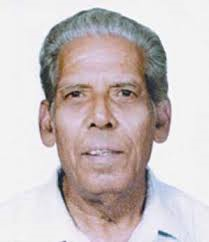
(Credit: shehritv.com)
When somebody you have known for 54 years suddenly passes away, it is always a shock. When, however, the person has been in a coma for some considerable time and then pegs down from unnatural causes, it somehow lessens the feeling of distress, for one is forewarned that the worst could happen –– like in the case of Izharul Hasan Burney, popularly referred to as IH Burney. He had had a fall at home and went into a long coma from which he never recovered. Burney was a founding member of the Karachi Press Club. He never won any laurels or honours, but was a ceaseless campaigner for the freedom of the press. He came across as a strict disciplinarian who did his job to the best of his ability. He was a journalist from the old school –– a gentleman, correct, disciplined and hardworking –– a newspaper man to the core who never missed a deadline. He played by the rules –– something that a lot of younger journalists do not do. He knew the difference between news and views and corrected those who didn’t. And above all, he knew the importance of correct English.

Burney was a veteran of the fourth estate with a fierce sense of loyalty. He joined Dawn in 1958, in the hot metal-and-Linotype days when the paper was housed in a ramshackle clutch of barrack-like rooms on the embankment of a drain on south Napier Road –– and moved with the establishment when it was carted lock, stock and barrel to its imposing current location on Dr Ziauddin Ahmed Road. In his 54-year career with the paper, he started off as a crime reporter where he came into contact with the seamy side of the underworld. I still remember his account of an interview he conducted with the station house officer of Jacob Lines who had an inordinate fondness for gambling. He described the fellow as a lower order tyrant with a short fuse who always looked as if he was in desperate need of a drink. Later, he covered other areas of interest; and after his retirement from Dawn was rehired on contract as editor of The Star, the evening newspaper of the Group, where his colleagues described him as a hard taskmaster. He also spent some years in Dubai when Mahmoud Haroon was setting up the Khaleej Times, which belonged to Abdul Rahim and Abdul Latif Galadari. His last assignment was as director of the chairman’s secretariat.
Burney was exceptionally fond of cricket, which along with war was the only other thing that united the Pakistani nation. Of course he had his favourites, like everybody else, which usually changed with the seasons. He was also very fond of chess and we often indulged in a Round Robin contest at the Karachi Press Club with Hasin Ahmed, a former employee of the US consulate general in Karachi, Ghazi Salahuddin of Geo, and Nargis Khanum who contributes articles and reviews to the Business Recorder. On one occasion while the telly was crackling in the background during a match between India and Pakistan, and our batsmen were giving their very best shot at snatching defeat from the jaws of victory, Hasin Ahmed decided to act as commentator. What followed was a highly spirited commentary on the virtue of each of our players in chaste Urdu. When he had finished Burney turned to me and asked who I thought was the greatest batsman that ever lived. I unhesitatingly replied it is Sachin Tendulkar. “Well, now that is settled, can we get on with our chess game?”
Published in The Express Tribune, April 27th, 2014.

I’m so proud of you grandpa. I miss you so much.